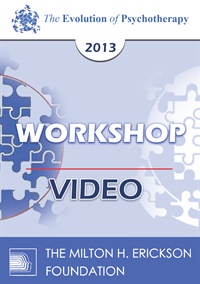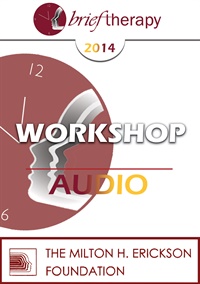
- Average Rating:
- Not yet rated
- Topic Areas:
- Eye Movement Desensitization and Reprocessing (EMDR) | Workshops | Brief Therapy | Trauma
- Categories:
- Brief Therapy Conference | Brief Therapy Conference 2014
- Faculty:
- Francine Shapiro, PhD
- Duration:
- 1:39:56
- Format:
- Audio Only
- Original Program Date:
- Dec 12, 2014
- Short Description:
- This presentation will provide therapeutic guidelines to help identify the source of a wide range of clinical problems, and demonstrate how they can be addressed. EMDR therapy is widely recognized as an effective trauma treatment by organizations such as the American Psychiatric Association and the World Health Organization. In addition, 20 randomized studies demonstrate positive effects of the eye movement component. Research has also clearly demonstrated that certain kinds of life experiences lay the foundation for both mental and physical problems. Clinical and neurobiological research demonstrates that EMDR therapy directly addresses the physiological basis of clinical symptoms and dysfunction.
- Price:
- $15.00 - Base Price
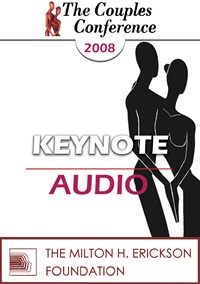
- Average Rating:
- Not yet rated
- Topic Areas:
- Keynotes | Couples Therapy | Trauma | Eye Movement Desensitization and Reprocessing (EMDR) | Hypnosis | Neurobiology
- Categories:
- Couples Conference | Couples Conference 2008
- Faculty:
- Bessel van der Kolk, MD
- Duration:
- 1:05:52
- Format:
- Audio Only
- Original Program Date:
- Apr 25, 2008
- Short Description:
- Starting with a review of recent studies on the neurobiology of trauma, Dr. van der Kolk will examine the utility of approaches from the fields of hypnosis, body oriented therapies and EMDR, both with research data and videotaped clinical interventions. The integration of these approaches during different stages of treatment will be discussed.
- Price:
- $15.00 - Base Price
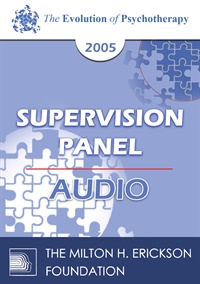
- Average Rating:
- Not yet rated
- Topic Areas:
- Supervision Panels | Case Discussions | Eye Movement Desensitization and Reprocessing (EMDR) | Narrative Therapy | Cognitive Behavior Therapy (CBT)
- Categories:
- Evolution of Psychotherapy | Evolution of Psychotherapy 2005
- Faculty:
- David Barlow, PhD | Francine Shapiro, PhD | Michael White, B.A.S.W.
- Duration:
- 59 Minutes
- Format:
- Audio Only
- Original Program Date:
- Dec 09, 2005
- Short Description:
- This session presents live case consultations with senior clinicians responding to complex trauma, anxiety, and relational dilemmas. Participants hear contrasting yet complementary perspectives from EMDR, narrative therapy, and cognitive-behavioral approaches as panelists work through cases involving childhood sexual abuse, social phobia, family power dynamics, and domestic violence. The discussion models how different therapeutic frameworks assess risk, build resilience, and identify meaningful points of intervention while staying grounded in the client’s values and lived context. Moderated by Daniel Eckstein, PHD
- Price:
- $15.00 - Base Price
- Average Rating:
- Not yet rated
- Topic Areas:
- Workshops | Eye Movement Desensitization and Reprocessing (EMDR) | Psychotherapy
- Categories:
- Evolution of Psychotherapy | Evolution of Psychotherapy 2005
- Faculty:
- Francine Shapiro, PhD
- Course Levels:
- Master Degree or Higher in Health-Related Field
- Duration:
- 1:16:56
- Format:
- Audio and Video
- Original Program Date:
- Dec 07, 2005
- Short Description:
- EMDR is guided by the Adaptive Information Processing paradigm, which differentiates it from other forms of psychotherapy. The implications of this paradigm will be explored in relation to a variety of recent clinical case studies and research reports. Questions from participants will be used to explore potential clinical applications.
- Price:
-
Sale is $29.00
price reduced from Base Price - $59.00
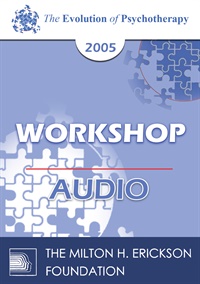
- Average Rating:
- Not yet rated
- Topic Areas:
- Workshops | Trauma | Eye Movement Desensitization and Reprocessing (EMDR) | Hypnosis | Memory | Neurobiology | Neuroscience | Psychotherapy
- Categories:
- Evolution of Psychotherapy | Evolution of Psychotherapy 2005
- Faculty:
- Bessel van der Kolk, MD
- Duration:
- 2 Hours 7 Minutes
- Format:
- Audio Only
- Original Program Date:
- Dec 10, 2005
- Short Description:
- Starting with a review of recent studies on the neurobiology of trauma, Dr. van der Kolk will examine the utility of approaches from the fields of hypnosis, body oriented therapies and EMDR, both with research data and videotaped clinical interventions. The integration of these approaches during different stages of treatment will be discussed.
- Price:
- $15.00 - Base Price
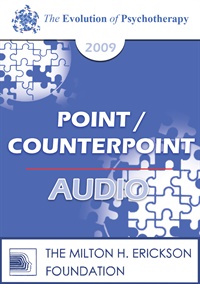
- Average Rating:
- Not yet rated
- Topic Areas:
- Point/Counterpoint Sessions | Trauma | Eye Movement Desensitization and Reprocessing (EMDR) | Psychotherapy
- Categories:
- Evolution of Psychotherapy | Evolution of Psychotherapy 2009
- Faculty:
- Francine Shapiro, PhD
- Duration:
- 1 Hour 8 Minutes
- Format:
- Audio Only
- Original Program Date:
- Dec 09, 2009
- Short Description:
- EMDR has been used worldwide over the past decade as an empirically validated trauma treatment. During that time, it has become clear that it is possible to simultaneously alleviate suffering, help stop the cycle of violence, and address the devastating effects of trans-generational transmission. The clinical implications for simple symptom reduction versus personal growth and resiliency will be explored.
- Price:
- $15.00 - Base Price
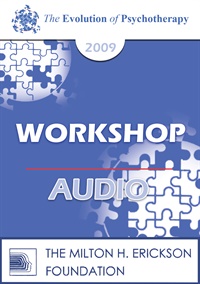
- Average Rating:
- Not yet rated
- Topic Areas:
- Eye Movement Desensitization and Reprocessing (EMDR) | Workshops | Memory | Psychotherapy
- Categories:
- Evolution of Psychotherapy | Evolution of Psychotherapy 2009
- Faculty:
- Francine Shapiro, PhD
- Duration:
- 1 Hour 56 Minutes
- Format:
- Audio Only
- Original Program Date:
- Dec 13, 2009
- Short Description:
- EMDR directly addresses the physiologically stored memory networks that underlie both psychological problems and mental health. This orientation to both case conceptualization and treatment will be explored to address diverse clinical applications, including attachment issues, body image, chronic pain, substance abuse, sexual dysfunction, personality disorders, and other presenting complaints. The Integration of EMDR with family therapy practices will also be discussed.
- Price:
- $15.00 - Base Price
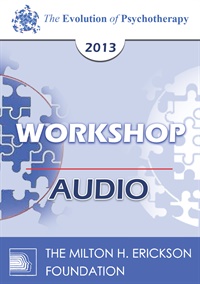
- Average Rating:
- Not yet rated
- Topic Areas:
- Eye Movement Desensitization and Reprocessing (EMDR) | Workshops | Psychotherapy | Therapist Development
- Categories:
- Evolution of Psychotherapy | Evolution of Psychotherapy 2013
- Faculty:
- Francine Shapiro, PhD
- Duration:
- 1 Hour 59 Minutes
- Format:
- Audio Only
- Original Program Date:
- Dec 11, 2013
- Short Description:
- Research has clearly demonstrated that certain kinds of life experiences lay the foundation for a wide range of mental and physical problems. Clinical and neurobiological research indicates that EMDR therapy directly addresses the physiological basis of clinical symptoms and dysfunction. Group exercises, case description and treatment videos will help participants examine the implications of this research and its application to clinical practice. Clinical examples will address individual, family and societal issues.
- Price:
- $15.00 - Base Price
- Average Rating:
- Not yet rated
- Topic Areas:
- Workshops | Eye Movement Desensitization and Reprocessing (EMDR) | Trauma | Psychotherapy
- Categories:
- Evolution of Psychotherapy 2013 | Evolution of Psychotherapy
- Faculty:
- Francine Shapiro, PhD
- Course Levels:
- Master Degree or Higher in Health-Related Field
- Duration:
- 2:18:20
- Format:
- Audio and Video
- Original Program Date:
- Dec 12, 2013
- Short Description:
- EMDR therapy is widely recognized as an effective trauma treatment by organizations such as the World Health Organization and the Department of Defense. In addition, 20 randomized trials demonstrate the positive effects of the eye movement component. Unlike other empirically supported approaches, it is unnecessary for the client to describe the trauma memory in detail or do daily homework to achieve positive effects. This presentation will demonstrate the eight phases of EMDR treatment with both adults and children through discussion, exercises and client videotapes.
- Price:
-
Sale is $29.00
price reduced from Base Price - $59.00

- Average Rating:
- Not yet rated
- Topic Areas:
- Workshops | Eye Movement Desensitization and Reprocessing (EMDR) | Psychotherapy
- Categories:
- Evolution of Psychotherapy | Evolution of Psychotherapy 1995
- Faculty:
- Francine Shapiro, PhD
- Duration:
- 1 Hour 45 Minutes
- Format:
- Audio Only
- Original Program Date:
- Dec 16, 1995
- Short Description:
- Observations of thousands of treatment sessions indicate that an innate processing system is physiologically geared to take disturbance to mental health. EMDR is an eight-phase methodology that catalyzes and accelerates the healing process. The clinician, therefore, is repositioned to the role of guide and facilitator. Treatment tapes will illustrate the method and majesty of the client's unfolding.
- Price:
- $15.00 - Base Price
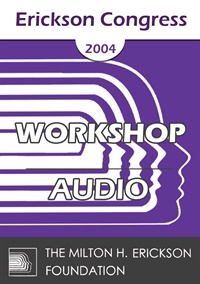
- Average Rating:
- Not yet rated
- Topic Areas:
- Workshops | Metaphors | Hypnosis | Eye Movement Desensitization and Reprocessing (EMDR)
- Categories:
- Erickson Congress | Erickson Congress 2004
- Faculty:
- Rubin Battino, MS | Harriet Hollander, PhD
- Duration:
- 1:49:37
- Format:
- Audio Only
- Original Program Date:
- Dec 02, 2004
- Short Description:
- This workshop presents live clinical demonstrations that show how guided metaphor and hypnosis can help clients reorganize life narratives, resolve anxiety, and move toward future-oriented change. Participants watch how client-generated stories, imagery, and subtle hypnotic language are used to shift meaning around loss, identity, creativity, and blocked action, without imposing interpretation. The session offers a close, experiential look at how metaphor, eye movement, and trance-based processes support emotional movement, agency, and renewed direction in real time clinical work.
- Price:
- $15.00 - Base Price
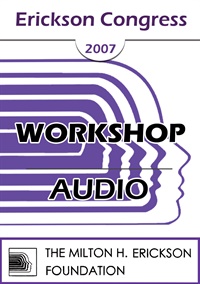
- Average Rating:
- Not yet rated
- Topic Areas:
- Workshops | Eye Movement Integration Therapy (EMI) | Eye Movement Desensitization and Reprocessing (EMDR)
- Categories:
- Erickson Congress | Erickson Congress 2007
- Faculty:
- Danie Beaulieu, PhD
- Duration:
- 1:56:19
- Format:
- Audio Only
- Original Program Date:
- Dec 06, 2007
- Short Description:
- Eye Movement Integration Therapy (EMI) is one of the most innovative and effective treatments for difficulties stemming from highly distress- ing memories. This workshop will present the basic principles of EMI, as it was developed by Connirae and Steve Andreas in 1989, and include the refinements Danie Beaulieu has added during the last ten years of practicing, teaching, researching and writing about this technique.
- Price:
- $15.00 - Base Price
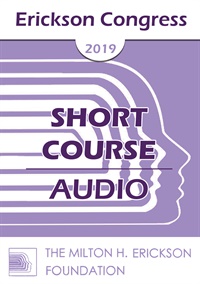
- Average Rating:
- Not yet rated
- Topic Areas:
- Short Courses | Anxiety | Depression | Ericksonian Hypnosis and Therapy Techniques | Children and Adolescent Therapy | Eye Movement Desensitization and Reprocessing (EMDR) | Hypnosis | Cognitive Behavior Therapy (CBT)
- Categories:
- Erickson Congress | Erickson Congress 2019
- Faculty:
- Joseph Sestito, MSSA, LISW-S
- Duration:
- 1 Hour 33 Minutes
- Format:
- Audio Only
- Original Program Date:
- Dec 12, 2019
- Short Description:
- The first factor that is of central importance is developing a strong therapeutic alliance with the client, mainly through empathically relating to him/her. Second, it will be shown how to guide adolescents and younger children to identify the specific Activating Event (AE) that is bringing about their unhealthy negative emotions through triggering self-defeating cognition(s).
- Price:
- $15.00 - Base Price
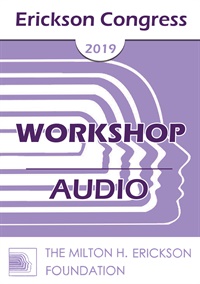
- Average Rating:
- Not yet rated
- Topic Areas:
- Workshops | Eye Movement Desensitization and Reprocessing (EMDR) | Ericksonian Hypnosis and Therapy Techniques
- Categories:
- Erickson Congress | Erickson Congress 2019
- Faculty:
- Bernhard Trenkle, Dipl. Psych
- Duration:
- 1 Hour 1 Minutes
- Format:
- Audio Only
- Original Program Date:
- Dec 15, 2019
- Short Description:
- Teaching since 12 years in China I also learned techniques from leading Chinese colleagues. In this workshop I will demonstrate an old Chinese technique used originally for preparing mentally for meditation in a way, so it can be used for psychotherapeutic purposes.
- Price:
- $15.00 - Base Price



